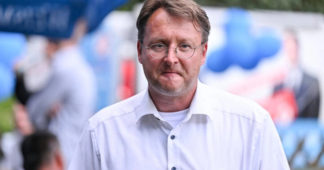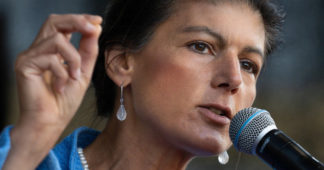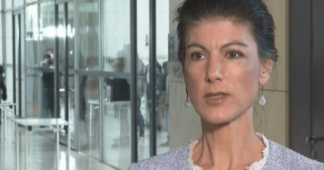Many East Germans are skeptical about Germany’s support for Ukraine and the stationing of US missiles. These issues dominate the upcoming election campaign in Saxony, Thuringia, and Brandenburg.
By Jens Thurau
August 19, 2024
In September, state elections will be held in Thuringia, Saxony and Brandenburg. Germany’s position on the Russian war in Ukraine and its supply of weapons to Kyiv, as well as the question of strengthening the Bundeswehr and the stationing of new US weapons in Germany feature big in election campaigning.
Foreign policy has become a key issue in the regional elections, even though it is the responsibility of the federal government. The reason why state politicians are suddenly taking a stance on issues of foreign policy is the widespread skepticism among the population, especially in eastern Germany, about the position of the federal government of center-left Social Democrats (SPD), environmentalist Greens, and neoliberal Free Democrats (FDP) on Ukraine.
Since Russia’s full-fledged invasion of Ukraine in March 2022, Germany has supported Ukraine with around €23 billion ($25 billion) in weapons, direct cash payments, and humanitarian aid. Only the US has provided Ukraine with more support.
The Forsa polling institute recently found that 34% of respondents in eastern Germany believe that Germany is doing too much to support Ukraine.
André Brodocz, a political scientist at the University of Erfurt, explains that federal political issues are being used to stir up emotions in election campaigning. “Even if nothing can really be done about the issue at the state level, it remains vital for the parties to just get voters to the polls,” he said in an interview with public broadcaster MDR.
Issues that are highly emotional, such as war and peace, of course, offer a great opportunity for this, he said
While the conservative Christian Democratic Union (CDU) and the Christian Social Union (CSU), at the federal level largely support the government’s actions in Ukraine, two parties that have recently gained strength in the east are opposed to the arms deliveries and are in favor of negotiations with Russia: The right-wing populist Alternative for Germany (AfD) and the Sahra Wagenknecht Alliance (BSW), a populist party that blends left-leaning economic policies with conservative migration and pro-Russian foreign policy initiatives.
Sahra Wagenknecht, the former Left Party politician who founded the BSW at the beginning of the year, has made the most of this position. The BSW is polling at around 20% in Thuringia and so the party could have an important say in the government after the election.
In an interview with Deutschlandfunk radio, Sahra Wagenknecht said in July: “The elections in the east are also a referendum on war and peace.” In other words, whoever supports Ukraine, the country being attacked is in favor of war. According to Wagenknecht, her voters are expecting her to ensure that the risk of war in Germany does not increase.
Wagenknecht’s position on the war in Ukraine is largely in line with that of the far-right AfD, which is ahead in the polls in Thuringia and Saxony at over 30%.
Referring to the sanctions against Russia, AfD co-chairman Tino Chrupalla said in an interview with public broadcaster ZDF in June that the economic sanctions against Russia must stop, arguing they primarily harm the German economy. “Germany has to take its own interests into account,” Chrupalla said. “We are paying exorbitant energy prices, inflation has skyrocketed, all as a result of the sanctions. This must stop.”
The state premier of Saxony, Michael Kretschmer (CDU), has called for a reduction in arms aid to Ukraine in view of holes in the federal budget and advocated diplomatic action in the Ukraine conflict. He told Redaktionsnetzwerk Deutschland (RND): “I am once again calling for increased diplomatic efforts. We need alliances, for example with China and India, to exert influence on Putin so that he will be prepared to agree to a ceasefire.”
Dietmar Woidke (SPD), the state premier of Brandenburg, expressed a similar view.
Stationing US missiles
Recently, the debate has gained momentum for yet another reason: In response to Russian aggression in Ukraine, there are now plans to station new US medium-range missiles in Germany as of 2026.
This first became public during the NATO summit in the US in mid-July. And in early August, Chancellor Olaf Scholz’s party, the Social Democratic Party (SPD), agreed to the deployment
The way this was communicated has now upset the SPD interior minister of Thuringia, Georg Maier. “The decision doesn’t make the election campaign any easier for us,” said Maier on Deutschlandfunk radio. However, he has no actual objections to the deployment as such: “National security interests come first, my concern is how this came about and how it was communicated.”
Saxony’s Michael Kretschmer has also spoken out in favor of stationing the missiles. In an interview with RTL and ntv in July, Kretschmer said that he “supports a missile defense shield for Europe,” but cautioned that “on the topic of weapons, what needs to happen, at the very least, is that the population be informed, that it is discussed, and the discussion must be broad,” Kretschmer cautioned. He later suggested a referendum on the issue.
“Mr. Kretschmer is knowingly running the risk of a dangerous escalation of the conflict with Russia and a new arms race,” explained Jörg Urban, AfD parliamentary group leader and leading candidate. “Apparently he doesn’t care that Germany only narrowly avoided a nuclear catastrophe several times during the Cold War.”
Sahra Wagenknecht has said on several occasions recently that the BSW will only be considering joining any state government if its partners clearly reject the plans to station new US weapons in Germany.
Foreign policy spokesman for the CDU, Roderich Kiesewetter, had a critical view of the whole debate over US missiles in Germany. He told DW: “This is also an example of how screwed up the security policy debate is in Germany, in which the basic principles of national security or deterrence are not understood everywhere politically and instead people immediately react hysterically. In my opinion, this decision to station missiles will have only a limited impact on the elections.”
This is certainly not a view shared by politicians from the governing parties of the SPD, Greens and FDP, as well as the conservative CDU, who are campaigning in the east. The fact is that parties like these in favor of continued support for Ukraine and new US weapons in Germany are increasingly alone.
We remind our readers that publication of articles on our site does not mean that we agree with what is written. Our policy is to publish anything which we consider of interest, so as to assist our readers in forming their opinions. Sometimes we even publish articles with which we totally disagree, since we believe it is important for our readers to be informed on as wide a spectrum of views as possible.










